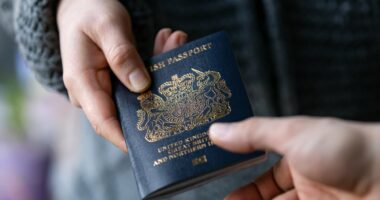Share this @internewscast.com
One of the initial tasks for any traveler gearing up for a vacation is ensuring their passport is current and valid.
While this remains a critical task, there’s another vital aspect that often slips through the cracks until the last minute.
Visa processing times can extend up to 45 days, posing the risk of being denied boarding, forfeiting flights, incurring hefty rebooking fees, or even getting stuck abroad.
According to Jamie Fraser, a travel specialist at Wildpacks, a transit visa permits travelers to pass through a country en route to another destination.
These visas are intended solely for connecting flights or brief layovers, not for exploring or prolonged visits.
Regulations vary by country, but typically, transit visas are valid from just a few hours to a couple of days.
‘Not having the correct transit visa can lead to being denied boarding before your flight even departs.
‘Airlines face penalties for carrying passengers without valid documents, so they will usually refuse check-in.’

When it comes to preparing for a holiday, checking that your passport is valid and in date is one of the first things most travellers do
He continued: ‘If you do reach your layover destination, immigration authorities may detain or deport you, and you could be sent back to your departure point at your own expense, including the cost of any return or rebooked flights.
‘In some cases, travellers can contact their embassy to request an emergency visa, but this isn’t always guaranteed.
‘The safest approach is to check embassy or government immigration websites before booking.
‘Airlines can offer guidance, but they aren’t responsible for visa compliance, and rules can change without warning.’
Countries such as the United States, India, Russia, and China maintain some of the toughest transit visa requirements.
In the US, for example, almost all non–Visa Waiver Program travellers must have a visa, even if they never leave the airport.
Jamie recommends choosing routes through countries that offer visa-free transit where possible and checking whether your connection requires leaving the secure area.
‘Having your passport, onward ticket, and any necessary visas ready helps prevent delays and keeps your trip stress-free,’ he said.

Visa applications can take up to 45 days, leaving many at risk of being turned away at the gate, losing flights, facing costly rebooking or being stranded
Last month, the Daily Mail reported that a tourist was caught out after applying for a visa to visit Canada on what looked to be the genuine Canadian government website.
However, after inputting his bank details, they were immediately contacted by his bank, alerting him to the fact that it was a scam.
Anxious that tourists may be targeted by the same scam, they shared their problem with the consumer group Which?.
Money expert Simon Dicey said: ‘It’s difficult to distinguish between bona fide foreign government websites and copycat ones, like the one you used.
‘We’ve also heard of a spate of scams related to applying for Canadian visas.
‘It’s safest to start by going to gov.uk/foreign-travel-advice.
‘This explains whether you need a visa for each country and contains links to the websites of foreign governments’ UK consulates.’
It comes as a warning has been issued as scammers are said to be targeting travellers during the rollout of the new EU border system.

The EES requires non-EU passport holders and those crossing Schengen borders to provide biometric data and fingerprints
The new Entry/Exit System (EES) launched last month, aiming to make going through airport checks faster. But scammers are said to be taking advantage of confusion over the new rules.
The EES requires non-EU passport holders and those crossing Schengen borders to provide biometric data and fingerprints.
There is currently no need for visa-exempt non-EU nationals to obtain any additional documentation to travel.
However, later in 2026, another new system will be rolled out, known as the European Travel Information and Authorisation System (ETIAS).
Scammers are preying on confusion over this second system.
Under the new ETIAS rules, travellers who don’t need a visa from non-EU countries, including the UK, Australia, the US and Canada, will have to obtain authorisation before short stays in the Schengen Area.
It will apply to 30 European countries – all EU states except Ireland plus Iceland, Norway, Liechtenstein and Switzerland.
But some travellers may confuse the upcoming EES – for which no extra applications are required – with the ETIAS.
The association of travel agents and tour operators ABTA and the European Union have made it clear that scammers are taking advantage of this opportunity.
ABTA told EuroNews: ‘People who try to apply for an ETIAS now may be at risk of fraud, with a loss of money and possibly personal data too.’

The new Entry/Exit System (EES) launched last month, aiming to make going through airport checks faster. But scammers are said to be taking advantage of confusion over the new rules
More than 60 fake websites have claimed to sell the ETIAS visa waiver – which has still not yet been introduced, ABTA said.
When it is brought into operation, the only place to apply will be on the official website.
Travellers have been warned to ignore apps, websites, or social media posts claiming to offer alternatives.
ABTA Director of Public Affairs Luke Petherbridge said: ‘The European Union is very keen to stress the fact that there is only one official site for purchasing an ETIAS visa-waiver, and people should not use other channels.’








